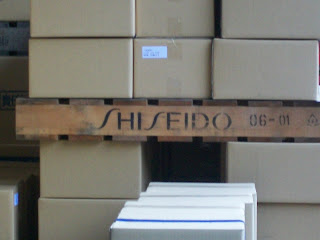(My feet are too big for all the quality control slippers we get)
After the tour of Danchisoko, we moved to a Shiseido warehouse. Shiseido makes many different products including makeup and hotel amenities, including the ones in our hotel. While many of the girls in our group were hoping for free makeup samples, they had to settle for free shampoo instead. Shiseido practices a Japanese concept called the 5”S” methodology, which is a system that encourages the use of sorting, straightening, sweeping, standardizing, and sustaining discipline. These impacts on the process were evident as we moved throughout the warehouse. The floors are cleaned every day! Don’t you wish you could use these principles in your life?
(If you look closely you can see all the people in the background)
One thing that I have noticed throughout our plant tours is that many plants and warehouses alike hire a lot of part-time laborers. In Japan, it is very hard for employers to fire their full-time workers. Also, the heavy unionization of workers requires that full time workers receive benefits and pensions as well. Firms exist that specialize in providing full time employees to companies that require them based on seasonal demand or demand spikes. Kuenhe+Nagel told us that if the part-time workforce is not available from these companies, they resort to placing want ads in the local newspaper. As Japan’s population begins to decline, I believe that finding manual labor will soon become a cultural problem, and the Japanese may be forced to outsource more manual tasks to areas with a large enough workforce such as China, India, or Malaysia.
(Manual Laborers in Isogo)




No comments:
Post a Comment